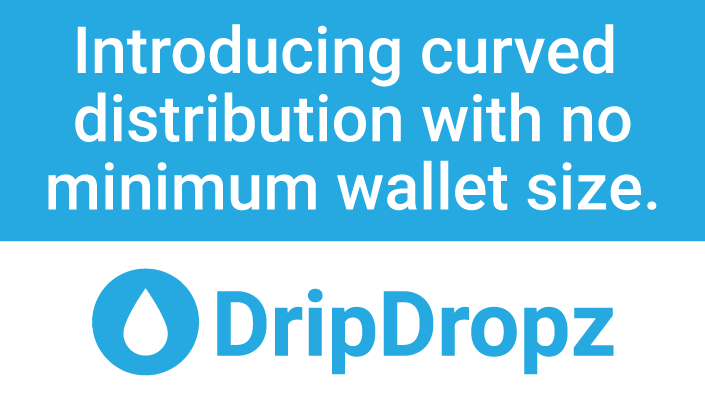DRIP Token Delivery Details
How Data and Math are Leading to Changes in Distribution
How Data and Math are Leading to Changes in Distribution
The DripDropz token distribution algorithm is changing. As of 5 May 2022 at 21:45:00 UTC, these changes will be live for all DRIP withdrawals.
DripDropz was founded on a pretty simple premise. The community needed a way to break the cycle of ADA stake leaving community pools and chasing new, shiny projects from ISPO to ISPO. The team also took on the mission to help users have another reason to move funds from centralized exchanges and to start staking with community pools.
We accomplished this by offering really cool rewards that you could claim no matter where you stake your ADA. Token creators, stake pool operators, and the Cardano community all got behind the idea.
As a result, DripDropz has now completed over 800,000 transactions. We’ve provided the infrastructure for the largest single reward drop in Cardano history (so far) with Sundae’s ISO tokens. With your help, we’ve raised over 30,000 ADA for charity. Not bad for a four-month-old company.
The Data
During that time we’ve collected data on how the platform is used, and how the demand for token delivery is changing. We’re learning about novel ways that developers and community leaders want to reward their loyal members. We’re seeing engagement to different projects going up as our users discover new-to-them opportunities in the Cardano blockchain.
We’re looking at all of these bright spots, and a few more troubling aspects. We’ve found and fixed a few minor bugs along the way. We watched the chain load max out, and figured out ways to improve the speed of delivery of your drops. We’ve also experienced a number of bad actors trying to game the rewards system. That’s our focus today.
Voting Feedback
One approach that we wanted to try was to use the new voting system that the team has been working on. We tried to write a question to establish a new floor for wallets to be able to receive DRIP. In that process we found out something more interesting from all of you. According to some of your feedback, you didn’t want to stop small wallets from participating. You wanted a better approach that didn’t harm someone who only had a small amount of ADA to stake. So we took that into account as we pushed on. This does mean that question #4 from the sample ballot is removed, but your feedback is rolled in to a tool that will better secure the platform against attacks, while still allowing all users to earn DRIP each epoch, regardless of wallet size.
Simple Delivery
To keep things simple, and to understand the dynamics of how users would react to different models, we started out providing DRIP in the simplest way possible: If you came to DripDropz and performed a withdrawal during an epoch, you could have 1000 DRIP tokens as one of your rewards. No other catch. It was important to see how users would respond.
Most of you responded the way we had hoped. You were happy to get another chunk of rewards for doing what you were already doing. Staking with community stake pools, and securing the Cardano network. Others set about creating hundreds of tiny wallets, with the minimum amount of stake, and then tried to collect on all of these wallets with automation. Our system caught the worst offenders automatically. Less ambitious spammers squeaked through the filters for a time, so we set some stricter ground rules to see if any changes would occur in user behavior.
Wallet Wars
If we set a higher minimum, wallet abusers just met the new minimum, and continued to do what they did. Now regular users who only had a single wallet, but with minimal ADA staked so far, were being left out and not able to get $DRIP. We didn’t want to end up in an escalating conflict. We didn’t want to entirely leave out users who had small stake. We wanted to impact decentralization in a meaningful way.
The Math
A wallet war is an untenable situation for the team, so we got to work. Well, Quinn did. He’s the team’s smart contract developer, and an all-around awesome math guy.
Quinn applied a probability formula from statistics that is known as the Log normal cumulative distribution function. If you’re wondering if it’s complex math, just google that, and check out the equation on Wolfram.
By applying this formula, we’re setting rewards on a scale that will increase with your ADA staked, but only up to a point. This will help reward users with small wallets and keep them engaged and growing their stake. It will also punish bad actors who are abusing DRIP and other tokens on the platform.
We will keep rewarding users who are doing the important work of staking and securing the blockchain.
Conclusion
The bottom line is this: Wallet abusers will no longer benefit from having hundreds of smaller wallets. The rewards will be too small to make it worth their while. Users with only small ADA stakes will again receive rewards, albeit a smaller reward than the old flat distribution. Normal users, with average ADA staked will always receive the full reward available. All users will be encouraged to stake as much as they can, which will lead to better decentralization, and more happy, healthy community stake pools.
We believe this new policy will be a positive net impact for the community. We’re always on the look out for changes that will make the improvements we want to see. This is one of them.



